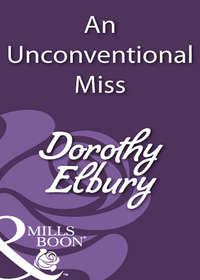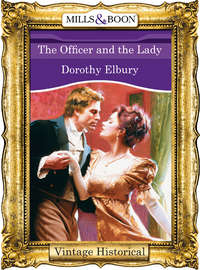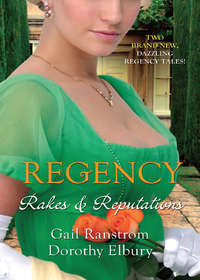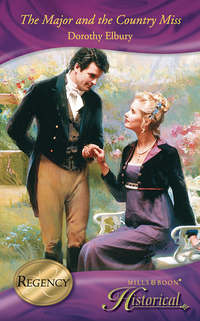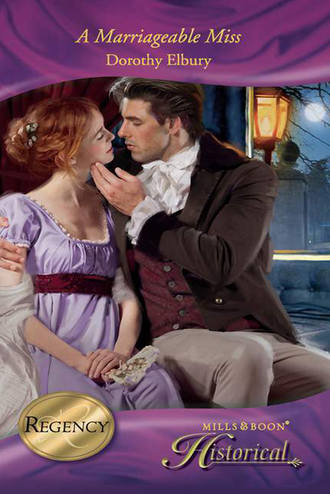
Полная версия
A Marriageable Miss
The first candidate to fancy his chances at securing the Wheatley fortune had been the thirty-five-year-old Viscount Farley, whose approach to hygiene left a great deal to be desired. Both soap and water were, it seemed, complete strangers to his toilette; instead, he preferred to douse his person with an overabundance of the highly pungent patchouli oil. In addition, due to his nauseating habit of taking great pinches of snuff throughout the entire day, every one of his neckcloths, shirtfronts and handkerchiefs was permanently stained with an unappealing yellowish tint. Fortunately for Helena, Mr Wheatley, having found that his daughter’s objections were entirely justified, had himself been quite willing to give that gentleman his congé.
Hard on Farley’s heels had come the foppish and appallingly henpecked Sir Percival Arnold, who had been bullied into putting his name forward by his impecunious widowed mother, an arrogant and overbearing woman possessed of remarkably poor taste and even worse manners. Regrettably, for Helena, the overly fastidious Sir Percy had proved somewhat more difficult to detach, due to his mother’s constant vigilance.
However, since Lady Arnold’s idea of introducing the Wheatleys into society had proved to be limited to inviting them to attend her dreary card parties, at which most of the guests seemed to be as socially unconnected as was their hostess, Helena had, eventually, been able to persuade her father that it was clear that no amount of consorting with the Arnolds was ever going to be likely to serve his original purpose. Mr Wheatley, who had been less than happy to have to dismiss yet another petitioner, had been placated only by his daughter pointing out that, at least, he would no longer be obliged to suffer Lady Arnold’s outrageously patronising remarks. And so, much to his mother’s shocked indignation, Sir Percy, too, had been given his marching orders.
The slightly questionable events to which her most recent suitor had taken her had done nothing to increase her regard for the so-called ‘upper classes’ and had merely borne out her belief that its members were decidedly lacking in decorum. Furthermore, she was well aware that her mother, had she lived, would have been less than happy to have permitted her daughter to attend such affairs.
Unfortunately, although Mr Wheatley’s subsequent disbelief and outrage, when confronted with the result of Viscount Barrington’s scandalous behaviour, was more than sufficient to eradicate the earlier disappointments from his memory, it also seemed to have the effect of making him more determined than ever to achieve his goal.
‘Hence your father’s determination to draw up this contract that Markfield has described to me, I take it?’ nodded the countess, when the now highly embarrassed Helena’s reluctant explanations came, at last, to a close. ‘Well then, in the furtherance of your own strategy, it surely goes without saying that my grandson’s presence at your side will be more than sufficient to shield you from the unwanted attentions of any other would-be suitor. Therefore, if you agree to have Markfield escort you to some of this Season’s more prestigious events, I will take it upon myself to sponsor your début into society.’
Helena’s brow furrowed. ‘It is very good of your ladyship,’ she faltered. ‘But I fail to see why you should wish to concern yourself with my difficulties.’
The countess gave a graceful shrug. ‘Your difficulties are hardly my concern, child,’ she replied indifferently. ‘My objective is the safeguarding of the Standish heritage for future generations and it would appear that this scheme is, at present, our only hope. To that end, insofar as I am concerned, such time as we can buy ourselves can only be to our advantage. Any received impression that Markfield might stand to benefit from your father’s fortune would do our cause no harm at all and, at the very least, should win us sufficient time to garner whatever resources we still have available.’
Although she managed to keep her features perfectly composed, Helena could not help but feel a little surge of satisfaction at Lady Isobel’s words. The countess, it was clear, was simply proposing an arrangement very similar to that which she herself had put to Markfield barely two days ago. The only difference being, of course, was the fact that her ladyship was looking at the situation from her own particular point of view.
Having quickly assessed her position, Helena soon came to the conclusion that, at this juncture, it would serve her purpose very well to appear to go along with whatever suggestions the countess put forward. In any event, until she had managed to figure out precisely how to rid herself of Markfield in such a way as to satisfy her father’s exacting requirements, she realised that she had very little choice in the matter.
However, before she was able to formulate an adequate response to the countess’s proposition, there came a tap on the door, followed by the arrival of the butler bearing the tea things. The countess’s insistence that she should make herself useful pouring out the tea was sufficient to occupy Helena’s attention for the next few minutes, since she was well aware that her hostess would be assessing her competence at performing this mundane but vital function.
Fortunately, from the slight smile that appeared on Lady Isobel’s lips as Helena placed the cup and saucer carefully on to the small table at her hostess’s right hand, it would seem that the dowager had been able to find nothing of which to disapprove.
‘It would appear that your mother taught you well, my dear.’ Inclining her head, the countess indicated her satisfaction. ‘Perhaps I have been overly harsh in my appraisal of you—your manners clearly leave nothing to be desired. In point of fact, it does seem to me that you would have very little trouble in passing yourself off amongst the beau monde. Come now, Helena, what do you have to say? An offer such as this is hardly likely to come your way again.’
Helena gave a brisk nod. ‘I am prepared to go along with what you suggest, ma’am. Shall we say for a period of two or three weeks, perhaps?’
The countess threw up her hands in astonishment. ‘Two or three weeks, child! If we are to make any sort of an impact, it will require two months, at the very least!’
‘I had not intended that I should make an impact, your ladyship,’ replied Helena, dismayed. ‘I assure you that I would be perfectly content to attend the occasional assembly and, possibly, a couple of visits to the theatre.’
‘That might satisfy you, miss,’ countered the dowager, with some asperity, ‘but it would hardly serve our purpose. For this scheme to have any effect, you and Markfield will need to be seen together everywhere—at the opera house, in the park, at Almack’s—in fact, at any worthwhile social function to which I can procure an invite. Make no mistake, my gel, entry into society is by no means as simple as you seem to suppose!’
‘I had not supposed it to be simple, ma’am,’ protested Helena, growing more and more apprehensive by the minute. What had started out as a straightforward ploy to protect her father from unnecessary stress was beginning to turn into a predicament of a rather different nature. With the strings of control now firmly in the countess’s hands, Helena was conscious that it would take a good deal of ingenuity on her part to find a way to extricate herself from this entanglement.
‘And if Lord Markfield does not agree?’ she ventured, clutching at straws.
‘With what might I not agree?’
With a guilty start, Helena spun round to see Markfield himself crossing the room. Uncomfortably aware that she had now entered into yet another pact, a faint flush spread across her cheeks. Would Lady Isobel divulge the details of their recent conversation to her grandson, she wondered but, more to the point, would he let slip that the scheme to which he had already given his agreement committed him to a far shorter duration than that which the dowager was demanding? Crossing her fingers, she forced a smile.
‘Her ladyship has been making some suggestions as to how we might proceed,’ she said lightly, turning again to the countess. ‘Perhaps you would care to elaborate, ma’am?’
‘Mere details,’ replied the dowager, shrugging diffidently. ‘However, it has just this minute occurred to me that, had I chosen to keep up my acquaintance with the Ashingtons, Miss Wheatley’s mother, Louisa—who, you must remember, was a peeress in her own right—could well have been my goddaughter. Since it is highly improbable that there is still anyone around who might be likely to dispute this point, I believe that this is the story we should put about.’
He frowned. ‘Surely a good many of your acquaintances may well wonder why this fact has never come to light before?’
Lady Isobel glared at him and pursed her lips. ‘Do stop being so difficult, Richard!’ she retorted. ‘You really cannot expect someone of my advanced age to keep a track of every one of her numerous godchildren! It was only when Miss Wheatley’s name was drawn to my attention that I recalled the connection. That this should have occurred at the same time as you succeeded to the title is pure coincidence.’
For one moment, Helena wondered if she could have misunderstood the countess’s words for, if she had not, it would appear that her ladyship was already well into the process of believing her own fabrication. Stifling a smile, she could not resist glancing up at Markfield, in order to gauge his reaction to his grandmother’s performance. To her astonishment, the earl, too, seemed to be having some difficulty in controlling his own mirth. But then, as he caught her eye on him, he winked and gave her a quick grin, causing a sudden quiver of agitation to cascade through her. Blushing, she dropped her eyes and tried to concentrate on the countess’s continuing remarks.
‘In any event,’ her ladyship was saying, ‘it is hardly as though anyone would take it upon themselves to challenge me!’
‘That’s certainly true,’ chuckled her grandson. ‘Who would dare? I swear I have seen both dukes and generals quail at one word of disapproval from you!’
‘Enough of your sauce, my lad!’ Eyeing him balefully, the countess wagged an imperious finger at him. ‘If you have a better idea, then I am sure that both Helena and I would be glad to hear it.’
His lips still twitching, Richard shook his head and held up his hands in a playful gesture of surrender. ‘Consider me at your command, ma’am. In matters such as these, I bow to your greater expertise.’
After eyeing him suspiciously for a moment or two, the countess turned her attention back to Helena, who had been watching the interplay between Markfield and his grandparent with increased interest. It seemed clear to her that, despite the light-hearted sparring that went on between them, the two of them had considerable respect and affection for one another. This rather surprising discovery had the effect of strengthening her growing belief that this particular aristocrat was something of a cut above the likes of the motley crew with whom she had had the misfortune to associate previously. All things considered, she decided, a few weeks in his company could scarcely do her any harm and would certainly afford her father plenty of time to recover from his latest attack. Deep in contemplation, she suddenly became aware that Lady Isobel was addressing her once more.
‘You do ride, I take it?’
Helena barely had time to nod her head before the countess was firing other questions at her, concerning her ability to converse in French, stitch a sampler, play the pianoforte and dance a waltz.
‘Not that you will be allowed to do so to begin with, of course,’ added her ladyship, of the last, which Helena was obliged to admit that she had not come across, since dancing, along with the rest of her tuition, had virtually ceased at her mother’s death.
‘No matter—when the time comes, Markfield shall instruct you.’
Flicking another glance at the now-seated earl, Helena found, to her surprise, that his eyes were fixed searchingly upon her face, no doubt trying to gauge her reaction to his grandparent’s intense barrage. At his clearly concerned expression, her lips curved in an involuntary smile. Their eyes locked and, for one breathless moment, during which time the whole world seemed to shudder to a standstill, she found herself incapable of rational thought. Her heart pounding, she forced herself to tear her eyes away from his mesmerising gaze, furious with herself for having been so foolish as to allow her carefully constructed guard to drop.
All at once, Richard’s spirits rose. Taking a deep breath, he relaxed and, leaning back in his seat, reasoned that the future did not, after all, look nearly as bleak as it had a few hours earlier. Indeed, in the light of the extraordinary discovery that his grandmother appeared to be somewhat taken with her stock-broker’s rather unusual daughter, it was becoming increasingly clear that the bulk of his potential problems might well be on the way to being resolved. Such was Lady Isobel’s reputation amongst the haut monde that, with her at the helm of the project, it was highly unlikely that this particular ship would run aground. Added to which, the idea of spending more time in Miss Wheatley’s company seemed, for some strange reason, to be growing more appealing by the moment.
Chapter Six
Lottie was almost beside herself with a combination of worry and impatience. She had been standing at the window for almost half an hour and when, at last, Markfield’s carriage hove into view, she was out of the morning room and down the stairs in a trice, all agog to learn how Helena had fared at the hands of the imperious Lady Isobel Standish.
Reaching the hallway just as Hayward opened the front door, however, she perceived that Lord Markfield, having brought Helena to the doorstep, was now in the process of saying his fare-wells. Uncomfortably aware that any overly inquisitive behaviour on her part would meet with her cousin’s disapproval, Lottie quickly withdrew from their line of vision but, since her curiosity was by this time almost at bursting point, she found that, by straining her ears, she was just able to catch the earl’s words.
‘I must thank you again for exercising such admirable self-restraint, Miss Wheatley,’ he was saying. ‘I fear that my grandmother can be—how shall I put it?—a little overbearing at times. I trust that she has not caused you to have second thoughts about our agreement?’
‘Not at all, sir,’ came Helena’s reply. ‘You must allow me to disabuse you of such a notion. I have every reason to believe that the countess and I came to understand one another perfectly well.’
‘In that case, may I take it that you are not averse to attending this soirée she has suggested on Friday?’
‘But, of course,’ returned Helena evenly. ‘If her ladyship truly believes that she will have no difficulty in procuring so many guests at such short notice, then it is hardly for me to cry craven.’
‘You continue to surprise me, Miss Wheatley,’ said Richard, a slight smile playing about his lips as he executed a bow and turned to leave. ‘With your permission, then, I shall call for you at eight.’
Realising that her cousin was shortly about to make her entrance, Lottie turned tail and hurried back up to the morning room where, picking up the book that she had recently discarded, she resumed her seat in an attempt to give even the most critical observer the impression that she had been involved in that activity for quite some time. She was, however, considerably taken aback when, just a few short minutes later, Helena opened the door and, with barely a glance in her cousin’s direction, made straight for the window, clearly intent upon catching a glimpse of Markfield’s departing carriage!
‘His lordship appears to have made a considerable impression on you,’ she observed wryly, laying her book aside. ‘May I assume that your visit could be deemed to have been something of a success?’
Suddenly conscious of her extraordinary actions, Helena turned briskly away from the window only to find herself facing a somewhat speculative expression in her cousin’s eyes.
‘As a matter of fact,’ she replied defensively, as a becoming flush suffused her cheeks, ‘it actually turned out to be a good deal more interesting than I had expected.’
Lottie’s face lit up. ‘How so?’ she demanded eagerly. ‘You were gone such an age that I began to fear they had abducted you for some huge ransom!’
Helena laughed. ‘Silly goose! It is clear that you read far too many inferior novels,’ she said, as after peeling off her gloves she made for the door. ‘But I promise that I shall tell you everything as soon as I have been in to see Papa—he will be anxious to know how I got on.’
‘You had best not go in to him just at the moment,’ her cousin advised her worriedly. ‘I peeped in only a short while ago and he was fast asleep. Digby has spent most of the afternoon trying to keep him calm. Uncle Giles is so very keen that this Markfield fellow should come up to scratch, Nell, that I fear you will be hard pressed to persuade him that he has any unacceptable failings.’
‘I rather doubt that he has,’ murmured Helena absently, but then, as she registered the attentive gleam in her cousin’s eyes, she collected herself and added hurriedly, ‘But none of that matters for the present. His lordship has already given me his promise that he will go along with the scheme and his grandmama also seems to have entered into the spirit of the thing most enthusiastically!’
She then proceeded to describe the more salient details of her interview with Lady Isobel, causing Lottie to express, in turns, various degrees of dismay, affront and amazement at the countess’s high-handed treatment of her beloved Helena.
‘You are so brave, Nell!’ she breathed, when her cousin had finished. ‘I could not have borne to have been spoken to in such a way! She sounds the most awful harridan!’ A sudden thought struck her and she paled. ‘I suppose I shall have to meet her if I am to accompany you on any future visits!’
Helena let out a little chuckle. ‘Oh, come now, Lottie,’ she cried. ‘You only have to call to mind old Mrs Pettigrew in your village! You remember how she always tries to mortify everyone with her overbearing behaviour, while you and I both know that, at heart, she would really like to make friends, but simply doesn’t know how to set about it. Look how quickly she came round when we offered to exercise her dog when she was laid up with the gout. In my opinion, her ladyship is merely a rather grander version of our Mrs Pettigrew!’
Lottie looked bewildered. ‘But the countess must have loads of friends if she is going to invite them all to this party of hers!’
‘Plenty of acquaintances, no doubt,’ replied Helena, with a decisive nod. ‘And hangers-on, too, probably, but I take leave to dispute that many of them are actual friends! As a matter of fact, the countess struck me as being rather a lonely old soul. Once you get past her hoity-toity grand manner, you will find that she is very little different from the likes of Mrs Pettigrew.’
‘If you say so,’ said Lottie, not at all convinced by her cousin’s argument, but then, changing the subject, she asked anxiously, ‘Am I to accompany you on Friday, do you know? I imagine that you would be expected to have some sort of a chaperon.’
Helena was silent for a few moments as she considered Lottie’s words but then, shaking her head, she felt bound to admit that the etiquette involved in this particular issue was somewhat outside her sphere. Although the matter had seldom arisen, it was perfectly true that, since her cousin had joined the Wheatley household, Lottie’s inclusion into any invitation, heretofore, had always been taken for granted. But, as Helena was well aware, small gatherings of her father’s business acquaintances, accompanied by their wives and assorted progeny, could hardly be compared with what Lady Isobel was likely to have in mind for the coming Friday.
‘I dare say I could ask Lord Markfield,’ she said eventually but then, recalling her earlier embarrassment over the faux pas regarding the carriage ride, she heaved a reluctant sigh. ‘But it is sure to give him even more reason to think us complete flats!’
At Helena’s crestfallen expression, a puzzled frown appeared on Lottie’s brow but she forbore from commenting on her cousin’s remark. Instead, she felt constrained to point out that, since Lady Isobel appeared to be so eager to sponsor Helena’s début, surely she was the person from whom any such advice must be sought.
Her face clearing, Helena reached out and grasped hold of Lottie’s hands. ‘But of course! How foolish of me not to have thought of that myself! Oh, Lottie, what an absolute gem you are. I shall write a note to her ladyship at once.’
Later that evening, however, as she sat at her father’s bedside and studied his grey, lined features, Helena found herself filled with serious misgivings regarding her continued deception of the sick man.
‘Now, my jewel,’ he was saying, his voice a husky whisper, ‘you must promise me that you will not allow this little setback of mine to interfere with any arrangement that the dear countess cares to make on your behalf. I feel myself growing stronger by the day and I find it extremely comforting to hear that you are not entirely averse to Lord Markfield’s suit. I was beginning to fear that we would never find the right husband for you!’
Helena attempted a careless laugh and patted his hand.
‘Good heavens, Papa! Anyone would think that you were anxious to get rid of me!’
The old man regarded her warmly. ‘Dear child.’ He smiled. ‘You know full well that that is not the case—I am merely concerned for your future well being. And, in the short time I was able to study his lordship, I do have to say that he struck me as being a very fine gentleman.’
‘Oh, I am sure you are right, Papa,’ replied Helena, uncomfortably aware that these were almost the exact words that her father had used in his appraisal of each of the three previous contenders for her hand. However, conscious of the physician’s recommendations that her father must enjoy absolute quietude, she refrained from any mention of those earlier conversations. Instead, having realised that the invalid was beginning to exhibit signs of fatigue, she gently disengaged her hand from his grasp, rose to her feet and bent to kiss his forehead.
‘You must rest now, dearest. Doctor Redfern has promised to come and see you tomorrow morning. I would not like him to think that you had been overtaxing yourself.’
‘You are a such a good girl, Helena,’ murmured Mr Wheatley, as he closed his eyes but then, almost at once, he forced his heavy lids apart and blurted out, ‘You will remember to have Markfield sign that contract, won’t you—I must have his promise…!’
‘Pray do not excite yourself, Papa,’ interjected Helena, utterly dismayed at her father’s sudden reference to the still-unsigned document, since she had been all but convinced that the dreaded subject had finally slipped his mind. ‘I am dealing with the matter, you have my word!’
As she let herself out of his bedchamber, however, fresh qualms began to assail her and she spent a very unsettled night wrestling over the combined difficulties of, not only fending off her father’s awkward questions but also, wondering how on earth she was going to come up with an acceptable excuse for terminating her association with the earl who, insofar as she was able to judge, appeared to be well nigh faultless!
The following day, having spent the morning helping out at the Chelsea soup kitchen, as was their usual practice, the two girls arrived home to find that, not only had the countess’s reply to Helena’s query been delivered during their absence but, in addition, a beautifully boxed posy of violets and primroses had arrived, courtesy of Lord Markfield.
To Helena’s relief—although rather to her cousin’s consternation—Lady Isobel indicated that, given that she was suitably gowned and coiffured, Miss Daniels’s presence on Friday evening would be quite in order.


